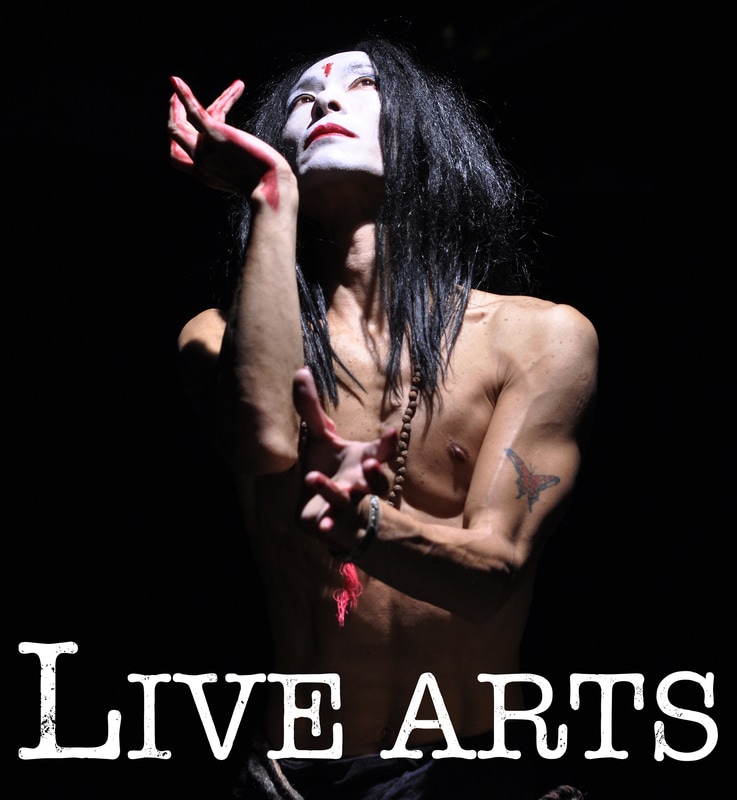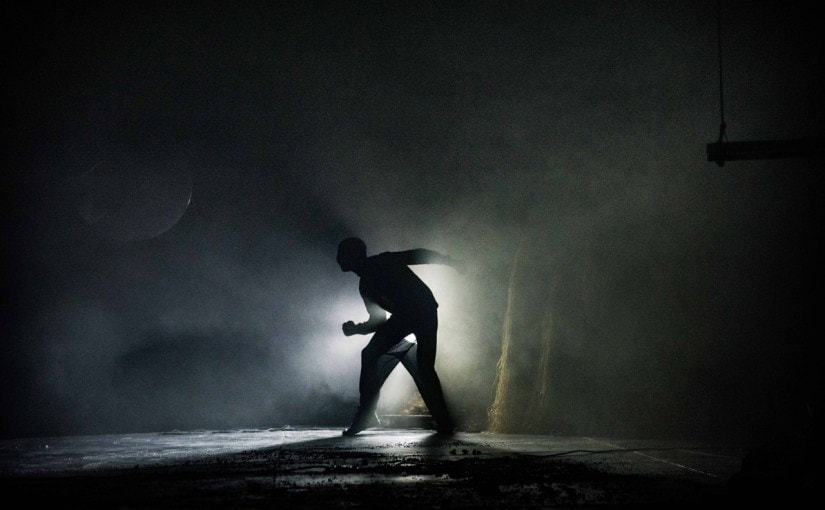|
Psychodream Review
Sezione diretta da Enrico Pastore e Sara Maddalena |
INTERVISTA A EURIPIDES LASKARIDIS
di BABILONIA TEATRI
di BABILONIA TEATRI
A cura di Enrico Pastore
|
Euripides Laskaridis è un artista di grande spessore e di straordinaria ricchezza visiva e immaginativa. I suoi lavori hanno la rara capacità di non lasciare mai indifferente il pubblico. Le immagini che crea nei suoi spettacoli colpiscono ed emozionano, fanno riflettere, lasciano il segno sulla retina e nell’animo. E questo senza bisogno di parola, solo corpo, suono, movimento. Con grande generosità e disponibilità Euripides Laskaridis mi ha concesso questa intervista, breve seppur densa, fatta via mail in inglese. Ho deciso di non tradurla per non rischiare, nel passaggio da una lingua a un’altra, di interpretare, o fraintendere quanto scritto da Euripides Laskaridis, che ringrazio vivamente per aver impreziosito questo spazio virtuale con la sua presenza.
Enrico Pastore: What is Titans for you? Euripides Laskaridis: TITANS is just a title for me. My generation was brought up hand in hand with TV and the TV series we would watch back then had these one or two word titles that seemed to encapsulate so much more than what was actually going on in reality. It is in this manner that I come up with the titles of my works. Another way of stressing how precise meaning and categorizing is overestimated in our society. I fight for a more open world where TITANS doens’t only mean the mythical creatures but also each and every one of us at the same time. EP: How you create a performance? What’s the starting point for the drammaturgy? EL: My starting point is always a wish. A wish to bring a creature or two into life. This time it was a tall skinny creature with a big forehead and a bit pregnant. In Relic I wanted to embody a voluptuous creature that felt like a pigeon. Then there is a wish to create a world of materials so I look for objects and textures here and there. The light, the sounds, the music have to be all handy during the creating process from day one. The drammaturgy comes much later. Only a few ideas in my head show a direction if the piece will be domestic or celestial, if it is going to be bright or dark but then as the characters come to life and small scenes are created the performance is being revealed to me in time and the dramaturgy will keep on being revealed to me the more I perform the works. EP: Which is/are the technic you use to create and to assemble the images? EL: There is no technic and no specific method. I just need a space to work in with materials in hand, the lights and the sounds. Then the team starts to create. Each one of us from their post. The images are created out of the use of specific objects and materials with the light and the set elements. If an image is ticklishness to me I am more inclined to play with it for many rehearsals and see if it can stick to be part of the show or not. EP: It’s correct my view upon the similarity between your work and the visual structure of the greek sacred icons? or is it my personal suggestion? EL: There is one scene that is absolutely inspired by the Byzantine style on sacred icons, I have admired them since a kid. EP: Why in your performance there’re always deformed bodies? EL: Transformation for me is not a purpose in itself. It just frees my imagination. When a non-existing creature is manifested on stage then I can see all humanity in him/her. EP: Why you don’t use any speech or word? Images are more communicative than any kind of speech? EL: I am not convinced yet that words are the best conveier of meaning. I use a language as I don’t believe in mute spectacles as well but the communication of feelings and sentiments is left upon the events that take place on stage. It is the performers that have to make things work, it is them that have to energize the space and through them the meaning may be shared to the audience. But never one closed meaning. An open meaning is the goal. An open poem - without actual words. EP: Your work, in my point of view, is beyond any genres, is not really dance, is not really theatre, is not really performance art, but in the same time is all of this. To create something new and powerful we had to live in border between the known languages? EL: I was never looking to create something new. I was just looking to create a language I would wish to see in the theatre and I kept not seeing. It is true that I hate categorization and I am happy my work seems to all the more be recognized as uncategorized. I like open forms, I think they are much more organic and true to life. EP: Which is/are the performance functions in your point of view? EL: Energizing the space with any means you have and taking risks to fail at every step of the way. Enrico Pastore
Scrivono in PASSPARnous:
Bruno Benvenuto, Ubaldo Fadini, Tiziana Villani, Claudia Landolfi, Alfonso Amendola, Mario Tirino, Vincenzo Del Gaudio, Alessandra Di Matteo, Paulo Fernando Lévano, Enrico Pastore, Francesco Demitry, Sara Maddalena, Alessandro Rizzo, Gianluigi Mangiapane, Nicola Lonzi, Marco Bachini, Daniel Montigiani, Viviana Vacca, Fabio Treppiedi, Aldo Pardi, Daniele Vergni, Mariella Soldo, Martina Lo Conte, Fabiana Lupo, Roberto Zanata, Bruno Maderna, Silvia Migliaccio, Alessio Mida, Natalia Anzalone, Miso Rasic, Mohamed Khayat, Pietro Camarda, Tommaso Dati, Enrico Ratti, Ilaria Palomba, Davide Faraon, Martina Tempestini, Fabio Milazzo, Rosella Corda, Stefania Trotta, Manuel Fantoni, Marco Fioramanti, Matteo Aurelio, Giuseppe Bonaccorso, Rossana De Masi, Massimo Maria Auciello, Maria Chirico, Ambra Benvenuto, Valentina Volpi, Massimo Acciai, Marco Maurizi, Gianluca De Fazio, Daniele Guasco, Carmen Guarino, Claudio Kulesko, Fabrizio Cirillo, Francesca Izzi, Antonio Mastrogiacomo, Giulia Vencato, Alessandro Baito, Margherita Landi, Mirjana Nardelli, Francesco Panizzo. |
Intervista a
Enrico Pastore sul suo Imaginary landscapes: tale on invisible cities di Francesco Panizzo Intervista a Irene Russolillo
di Enrico Pastore Un grande particolare.
A Novi Cad con il Workcenter of Jerzy Grotowski and Thomas Richards di Francesco Panizzo Incontri verticali
con Jurij Alschitz di Mariella Soldo Sottrazioni -
Conferenza in commemorazione di Carmelo Bene al Caffè Letteraio Le Murate di Francesco Panizzo |
|
|
Vuoi diventare pubblicista presso la nostra rivista?
sottoscrivi il bando. Accedi al link dall’immagine sottostante.
sottoscrivi il bando. Accedi al link dall’immagine sottostante.
Psychodream Theater - © 2012 Tutti i
diritti riservati





